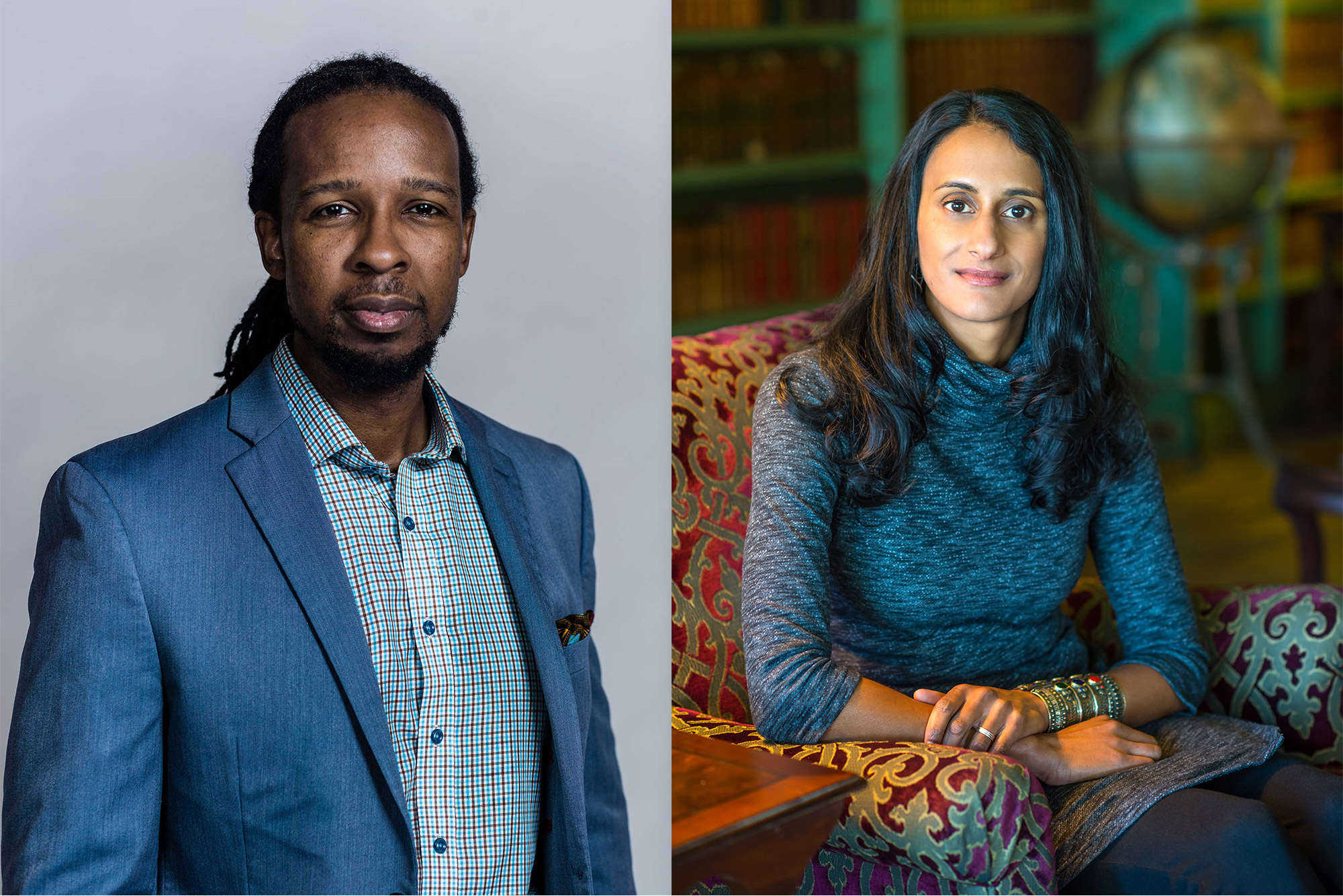
Ibram X. Kendi, director of BU’s Center for Antiracist Research (left), and Bina Venkataraman, Boston Globe editorial page editor. Photos by Janice Checchio (left) and courtesy of VenkataramanJOURNALISM & MEDIA
The ever-visionary Ibram X. Kendi has just announced an exciting project– a collaboration between his Boston University Center for Antiracist Research and The Boston Globe. Kendi and Globe editorial page editor Bina Venkataraman began emailing in summer 2020. Kendi had just left the Antiracist Research and Policy Center he founded at American University in Washington, DC to begin a similar effort in Boston. The digital conversations led to the discovery of a shared interest in Boston’s 19th century legacy as a center for the abolitionst movement as well as for progressive publications such as the Atlantic, the Boston Globe, and William Lloyd Garrison’s The Emancipator.
The BU Center and the Globe plan to resurrect The Emancipator as an explictly antiracist online publication. According to Kendi, when the anti-slavery Emancipator was first published in the 1820s few could imagine that slavery would end some 45 years later. Today it is hard to imagine a future without the pervasve and endemic stain of systemic racism in our country. The revivified Emancipator is a concrete and active commitment to that future.: that it can happen. The venture includes an all-star editorial board of antiracist thought leaders; financial and staffing commitments from the Globe, BU, and philanthropic groups; and the plan to hire co-equal editors (one at the BU Center and one at the Globe). In a March 18, 2021 interview on NPR’s Morning Edition Ms. Venkataraman asserted that the reputation of the Globe on racial issues is not spotless. She envisions a transformative impact of the project on the institutional culture of the paper, if not on journalism as a whole. The Emancipator will be a separate publication, and unlike the Globe, will be free. Yet a co-editor will sit at the Globe, and columnists from the paper will contribute to the new publication.
The stated goals of institutional and professional transformation caught my ear as I listened to the NPR broadcast. Could museums seeking to become more equitable and inclusive engage in similar collaborations with knowledgeable antiracist organizations? Could such ventures create a socially beneficial product and at the same transform museums through intensive work with an antiracist institution? Think of the museum as analogous to the Boston Globe – a time-honored institution with a chequered past when it comes to dealing with racial issues. Think of the BU Center for Antiracist Research as the local institution with scholarly and civic resources to examine racism in the community. What are some aspects of this collaboration that museums could emulate?
—
—A commitment to enhance museum anitracist practice and transformation through a community collaboration where the museum is the learner regarding antiracism while contributing its cultural resources in other dimensions.
—The appointment in each organization of an individual or group experienced in and sensitive to all aspects of community collaboration.
— Attention to local history: A concerted search for to links abolition, civil rights or other antiracist efforts in the history of locale served by the museum. Do organizations still exist that carry on that history, and what kind of partnership might be established?
—A mutually agreed upon period of conversation and exploration. This is needed to build trust and understanding prior to developing any kind of partnership; admission by the museum that it needs eduction and help in the area of inequity; and a commitment to a change of organizational culture;
—Concrete financial and staffing commitments on the part of both organizations commensurate with each instititon’s size and budget;
—Agreement on a collaboratively developed service or product that would both benefit the community and inspire internal transformation; a relationship of equals.
While working on this post I discovered that museums and journalists in Illinois had launched a collaborative project in the past year. The Prarie State Museums Project, led by Daniel Ronan, “gathered and coordinated a group of 16 freelance journalists across Illinois, from June to August 2020, to bring attention to the impact of Covid-19 on museum institutions across the State.” The list of funders gathered for the project is impressive, and the initiative resulted not only in increased coverage of museums during the pandemic, but also in discussions of racism, equity and othe issues facing museums during the summer of 2020. This initative differs from the Boston project in that it was created to promote greater understanding of museums rather than produce a product that would be mutually transformative of museums and journalism. But it shows that there are affinities to be explored and funding available for collaborations between museums and journalism.
The most important aspects of the Boston project, in my view, are its intentional antiracist focus; its creative mingling of non-traditional partners who have a stake in antiracist work; the deep instititonal commitment of both organizations on an equal footing; and the plan to make antiracist content freely and widely available. Is there a partner in your community with whom you could achieve these goals?
I welcome your comments on Twitter @gretchjenn. Here’s hoping that this spring finds you and your family safe and vaccinated!